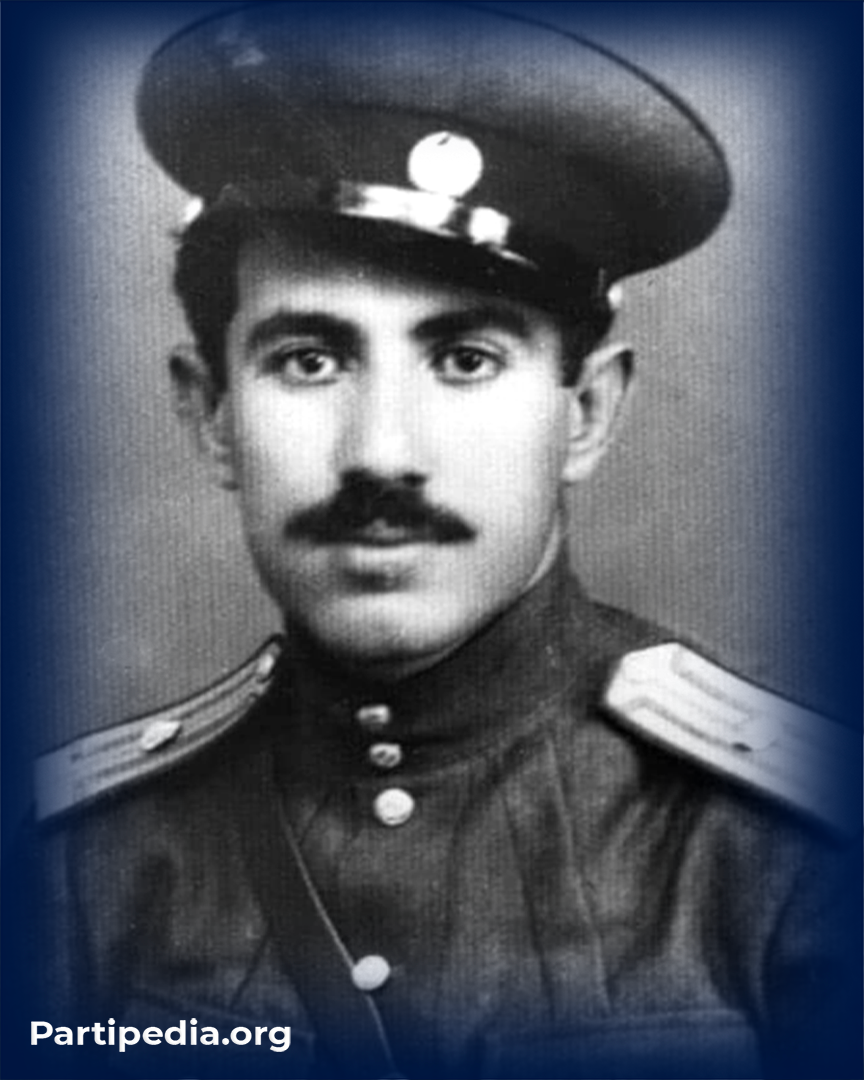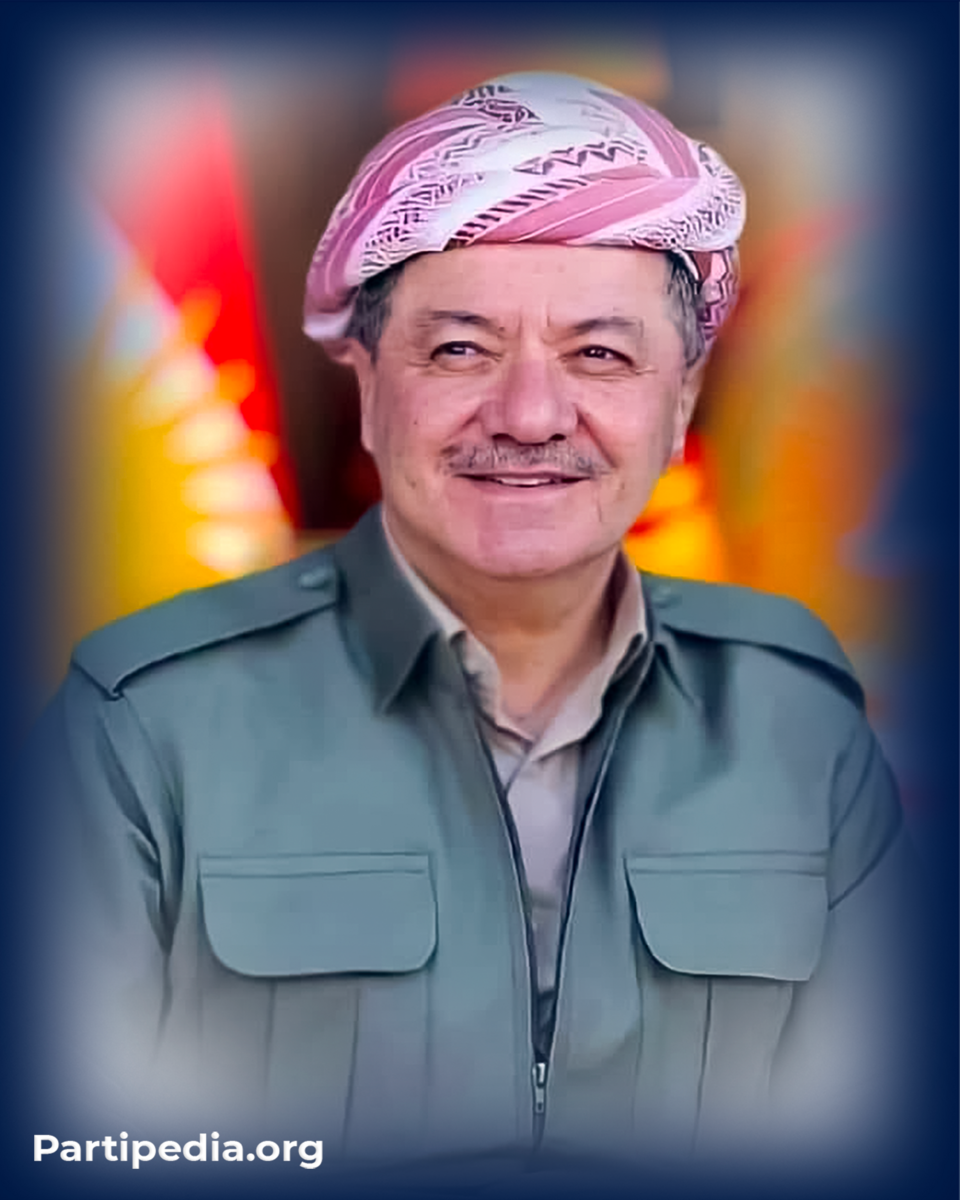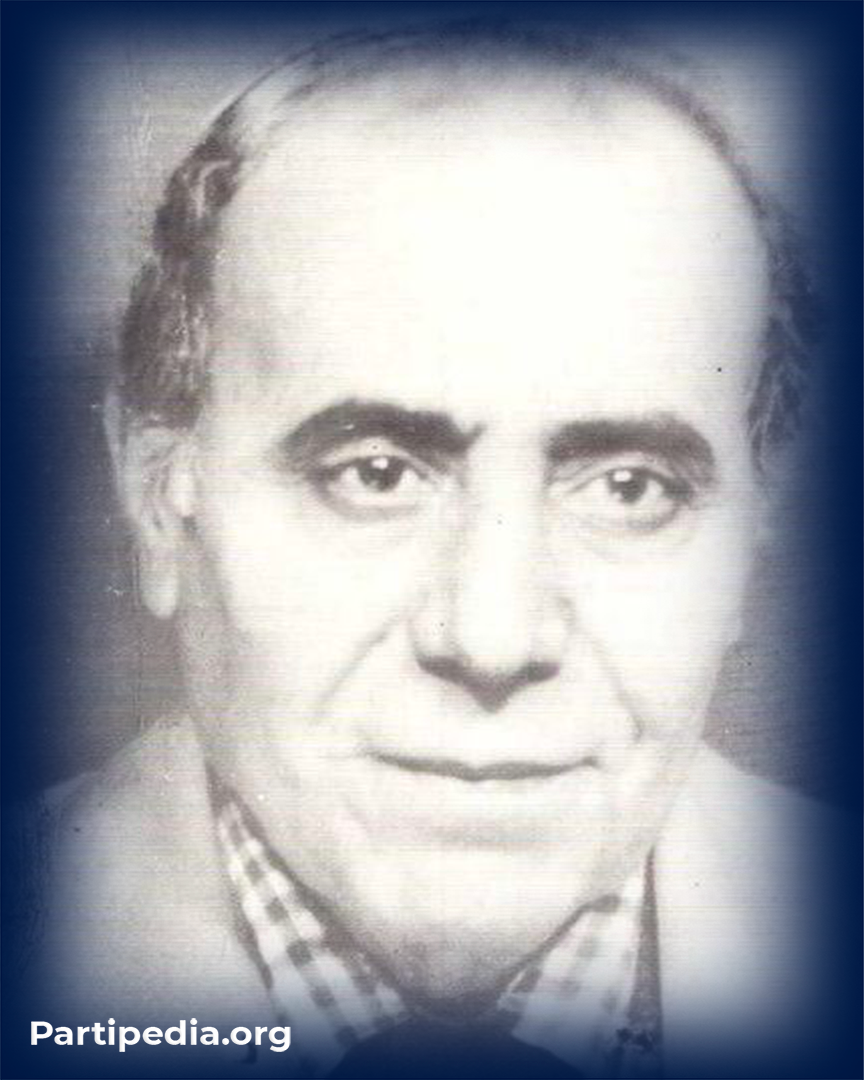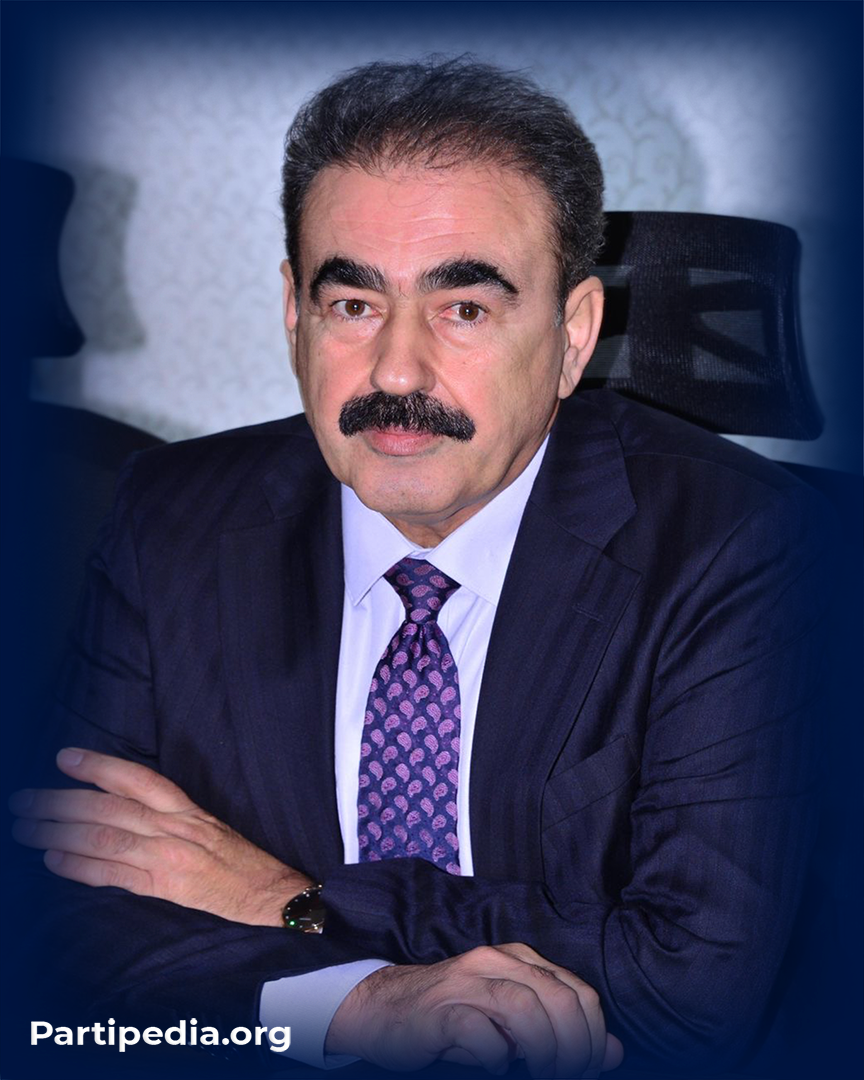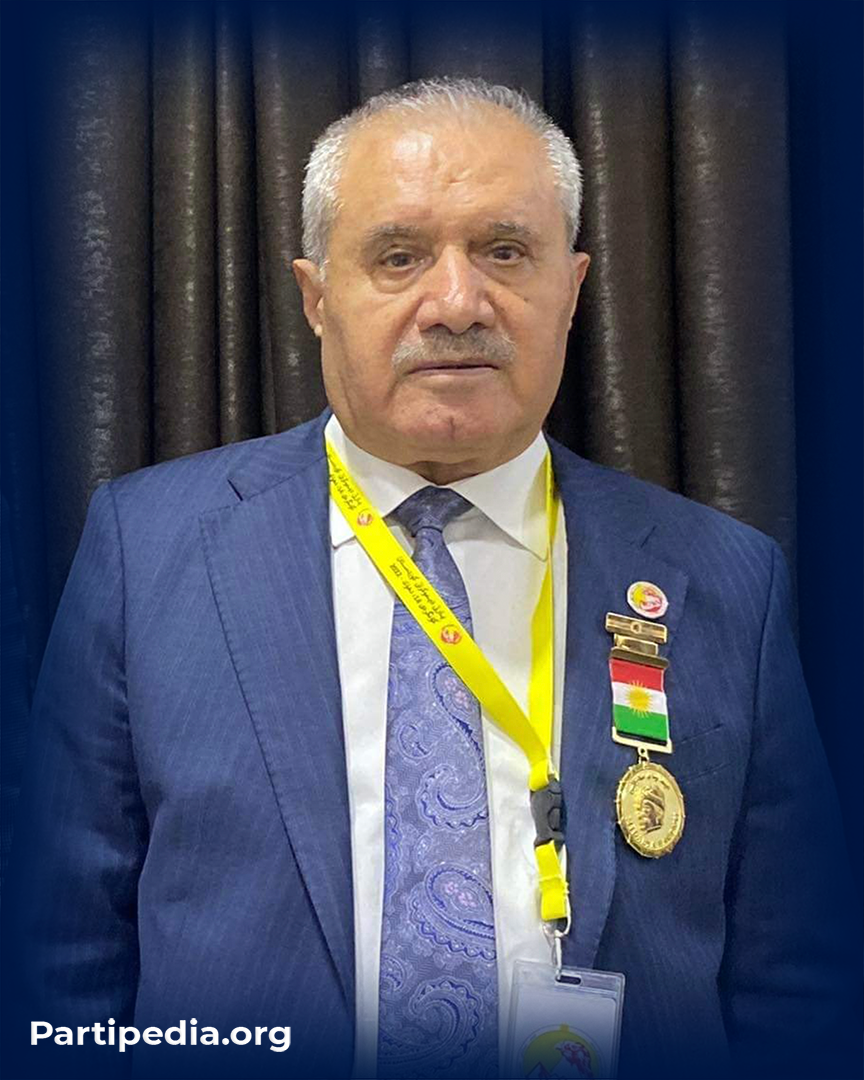Nuri Ahmad Taha Abdullah Agha, in 1946, was among the founders of the Kurdish Democratic Party (KDP). In 1953, he was elected a member of the Central Committee of the Kurdistan Democratic Party (KDP)-Iraq (Third Congress). Furthermore, he joined the ranks of the Peshmerga forces in 1961.
Biography
Nuri Ahmad Taha Abdullah Agha (Nuri Ahmad Taha Abdullah Agha) also known as Sherdl was born in Sulaimani, of Mukriyan tribe. His grandfather Abdullah Agha Dibukri in the mid-nineteenth century left the Dibukri region of Mukriyan in Eastern Kurdistan and moved to Sulaimani.
Ahmad Darwish Abdullah (1911–1998), also known as Akhol, and Kamaran Ahmad Taha (1929–1986), also known as Kamaran Mukri, were Nuri’s brothers.
Nuri began his religious education in Hujra. He completed his primary and secondary education in Sulaimani. In 1939 he completed his secondary education in Kirkuk. In 1939 he was admitted to the Baghdad Military College.
Furthermore, in 1941, he graduated from the Baghdad Military College with the rank of second lieutenant and became an officer of the Kurdish Hope Party. In 1941, he married Najiba Abdi Amini.
He was a refugee in Iran in 1974-1975. After the fall of the Aylul Revolution, he moved to the Syrian Arab Republic, then to the Federal Republic of Germany. After that on October 21, 1977, he returned to Iraq. 0He died in Sardasht town in Eastern Kurdistan, and he was buried in Saywan Hill in Sulaimani. Nuri was fluent in Kurdish and Arabic.
Service Record
Nuri enrolled in the Kurdish Freedom Association in 1935. Then, in 1936, he took part in the demonstrations during the Sulaimani funeral for General Mustafa Pasha Yamulki (1866–1936). He joined the Darker Association actively in 1939 after that. Additionally, he joined the Kurdish Hope Party in 1940. He worked in the military outpost in the Garmasir region close to Khanaqin in 1941. He knew President Mustafa Barzani (1903-1979) at Sulaimani in 1943.And in 1994, he contacted the ranks of the Kurdish Revival Society.
In 1944, he was imprisoned for five years for his Kurdish position. Later, he escaped from Baghdad Central Prison because of three Kurdish soldiers. In 1945, he became a member of the Freedom Committee. In 1946, he moved to Eastern Kurdistan. Furthermore, in the summer of 1946, he led a group of 60 Peshmerga. In 1946, he was among the founders of the Kurdish Democratic Party (KDP). In the same year, he commanded an organized and harmless retreat of the Kurdistan Democratic Republic (KDP) forces on the Saqiz front. On 21 December 1946, he was a member of the negotiating delegation of South Kurdistan to Tehran with Iranian, American and British authorities in order to return the Kurds to their homeland.
Moreover, in 1946, after the collapse of the Kurdistan Democratic Republic, he was a member of the Kurdish delegation to negotiate with Sarhang Ghafari in Naghdeh, Sarhang represented the Iranian army. in 1947 on his way to return to Southern Kurdistan, Nuri was arrested in the village of Zinwei Sheikh in Erbil province. He was imprisoned in Baghdad Central Prison for participating in the Kurdistan Democratic Republic Army. However, He was released by royal decree in 1953. At the end of 1952 he was transferred to Sulaimani Prison. In one of the Arabic-language newspapers in Baghdad he talks about his release to make the public put pressure on the government.
In 1953, he was elected as a member of the Central Committee of the Kurdistan Democratic Party (KDP) (Third Congress). Then in 1954, he ran for the Iraqi Parliament from Halabja of Sulaimani province. However, he was prevented by the authorities and exiled to Khurmal. In June 1954, he was a member of the joint committee of the Kurdistan Democratic Party (KDP) and the Iraqi Communist Party. Furthermore, in 1954, he oversaw the fourth branch committee.
He served on the committee that welcomed the body of Sheikh Mahmoud Saeed (1881–1956), also known as Sheikh Mahmoud Hafid, in October 1956. After a protest in Sulaimani to commemorate his funeral, he was taken into custody by the Iraqi police.
In 1956 became a member of the committee Kurdistan Democratic Party (KDP) headquarters (second unification). He traveled to Prague in 1958 with other dignitaries to celebrate the return of General Mustafa Barzani (1903-1979). He landed in Cairo on September 19, 1958, accompanied by President Mustafa Barzani. President Jamal Abdul Nasser (1918–1970) greeted them in the Qubba Palace.
On October 6, 1958, he arrived at Baghdad's Musana airport accompanied by President Mustafa Barzani and was welcomed by Kurdish and Arab people alike. He was also awarded for his participation in the Second Barzan Revolution on May 1959.
He traveled to Sulaimani in 1959 with General Mustafa Barzani. He visited the martyred Mustafa Khoshnaw and Mohammed Qudsi's burial grounds in 1959 with President Mustafa Barzani. He was elected to the Central Committee of the Kurdistan Democratic Party (KDP) - Fourth Congress in 1959 by the Congress' participants. Moreover, he was promoted to lieutenant on March 23, 1959, and re-entered the ranks of the Iraqi Republican Army. He was appointed governor of Rutba in 1959 and was given the rank of lieutenant. He was also elected to serve on the Kurdistan Democratic Party's (5th Congress) Central Committee.
He was in charge of Sulaimani and a member of the Revolutionary Organization Committee in November 1960. On December 17, 1961, he retired from service as a lieutenant. He returned to the Peshmerga forces in 1961, and he supervised the Peshmerga's military operations in Sulaimani. Furthermore, he was chosen to lead the fourth branch committee in 1961.
On December 18-23, 1961, he participated in the meeting of the Central Committee of the Kurdistan Democratic Party (KDP) in Awalani village of Sulaimani province (1914 - 1963). In order to continue the Aylul Revolution, Nuri voted for negotiations with the government of Abdul Karim Qasim (1914-1963). With the beginning of the Aylul Revolution, he fought for the freedom of Kurdistan under the pseudonym Sherdl (Lionheart). Also, Nuri was the head of the Khabat printing house.
In 1963, he was aware of the negotiations between the Political Bureau of the Kurdistan Democratic Party and the Ba'athist Arab Socialist Party for a coup against Iraqi Prime Minister Fariq Rukan Abdul Kareem Qasim (1914-1963).
In 1964, he advocated peace between the president's wing and the wing of the Political Bureau. In 1964, he was expelled from the ranks of the Kurdistan Democratic Party (KDP) for supporting the Political Bureau wing.
After the Ibrahim Ahmad-Jalal Talabani group entered the Iraqi government on December 28, 1966 and turned their backs on the Aylul Revolution, on February 21, 1966, he wrote a letter to President Mustafa Barzani expressing his readiness to serve the September Revolution and KDP.
On October 2, 1966, he retired from the Iraqi army. On the orders of President Mustafa Barzani, he assisted in a coup against the Ba'athist authorities in 1969 and was compelled to settle in the Balak region of the province of Erbil.
Sources:
-
ئهرشیفی دهستهی ئینسكلۆپیدیای پارتی دیموکراتی کوردستان.
-
به كوشش : كامبیز رزم آرا و كاوه بیات، خاطرات و اسناد سپهبد حاجعلی رزم آرا، (تهران ـ نشر پردیس دانش ـ چاپخانه طلایه آفاق ـ ١٣٩٣ ھ . ش)، ص ١٨٠.
-
عثمان علي، دراسات في الحركة الكوردیة المعاصرة ١٨٣٣ ـ ١٩٤٦ دراسة تاریخیة وثائقیة، (أربیل ـ مكتب التفسیر ـ مطبعة الثقافة ـ ٢٠٠٣م)، ص ٧٠١.
-
قادر ئهمینی قودسی، موكریان و رووداوهكانی له دهورانی سهفهوییه بهملاوه، (سهقز ـ ناوهندی چاپ و بڵاوكردنهوهی گوتار ـ ١٣٩٥ ك . ھ)، ل ل ١٩٠ ـ ١٩١، ٢١١.
-
ولیام ایغلتن الأبن، جمهوریة مهاباد ـ جمهوریة ١٩٤٦ الكردیة، ترجمة وتعلیق جرجیس فتح الله، (أربیل ـ دار آراس للطباعة والنشر و منشورات الجمل ـ ٢٠١٢م)، ص ١٠٠.
-
فاضل رسول، كردستان والسیاسة السوفیتیة في الشرق الأوسط، ترجمة غسان نعمان، (السلیمانیة ـ مكتب الفكر والوعي في الأتحاد الوطني الكردستاني ـ مطبعة مؤسسة حمدي للطباعة والنشر ـ ٢٠٠٨م)، ص ص ٢٥٩، ٢٦٤.
-
فهیسهڵ ڕەسول خۆشناو، بایۆگرافیای ئهفسهرانی كورد، بهشی دووهم، (تهران ـ چاپخانهی ڕۆژههڵات ـ ٢٠٢٠ز)، ل ل ٣٢٢ ـ ٣٢٥.
-
كریس كوچرا، جنبش ملی كرد، ترجمهی ابراهیم یونسی، چاپ دوم، (تهران ـ موسسه انتشارات نگاه ـ ١٣٧٧هـ ش)، ص ص ٢٢٦، ٢٣٨، ٢٥٣.
-
مههدی محهمهد قادر، پێشهاته سیاسییهكانی كوردستانی عێراق ١٩٤٥ ـ ١٩٥٨، (سلێمانی ـ سهنتهری لێكۆڵینهوهی ستراتیجیی كوردستان ـ ٢٠٠٥ز)، ل ل ١١٦، ١٢٢، ١٣٢، ١٣٤، ١٦٢، ٢٩٩، ٣٤٨ ـ ٣٤٩.
-
عهبدوڕەحمان شهڕەفكهندی، چێشتی مجێور، (پاریس ـ ١٩٩٧ز)، ل ل ٣٥٦، ٣٦١.
-
جهمال نهبهز، بیرهوهریینامهی ئهو رۆژانهی جارهكی دیی ناگهڕێنهوه، (سلێمانی ـ چاپخانهی شڤان ـ ٢٠١٧ز)، ل ل ٥٢، ٣٣٣ ـ ٣٣٤.
-
تۆفیقی مهلا سدیق، بیرهوهریهكانی ڕۆژانی حیزبایهتی و پێشمهرگایهتی و دوور خرانهوهم، چاپی دووهم، (ههولێر ـ چاپخانهی شههاب ـ ١٩٩٦ز)، ل ل ١٦، ٢١، ٧٣.
-
ئهحمهد دڵزار، بیرهوهری ڕۆژانی ژیانم، (ههولێر ـ وهزارهتی ڕۆشنبیری و لاوان ـ چاپخانهی شههاب ـ ٢٠١٩ز)، ل ١٢٧.
-
ئهحمهد باوهڕ، مێژووی هاوچهرخی عێراق ١٩١٤ ـ ١٩٦٨، (سلێمانی ـ چاپخانهی كارۆ ـ ٢٠١٨ز)، ل ل ٢٦٨، ٣٥٧.
-
ئهفراسیاو ههورامی، بارزانی مستهفا له ههندێك بهڵگهنامه و دۆكیومێنتی سۆڤیهتیدا ١٩٤٥ ـ ١٩٥٨، (ههولێر ـ دهزگای چاپ و بڵاوكردنهوهی ئاراس ـ چاپخانهی وهزارهتی پهروهرده ـ ٢٠٠٢ز)، ل ١٣٢.
-
ابوالحسن تفرشیان، قیام افسران خراسان، چاپ دوم، (تهران ـ انتشارات اطلس ـ ١٣٦٧هـ ش)، ص ١١٦.
-
بهكر عهبدولكهریم حهوێزی، گهشتێك به كۆماری مههابادا بیرهوهریهكانم له ڕۆژههڵاتی كوردستاندا ١٩٤٤ ـ ١٩٤٧، (ههولێر ـ دهزگای چاپ و بڵاوكردنهوهی ئاراس ـ ٢٠٠١ز)، ل ل ١٩، ٣٠، ٣٧ ـ ٣٨، ١٠١.
-
سالار حفید، علي العسكري والحكم للتأریخ، (بدون مكان ـ بدون سنة)، ص ٢٨.
-
حبیب محمد كریم، تاریخ الحزب الدیمقرطي الكوردستاني ـ العراق(في محطات رئیسیة) ١٩٤٦ـ ١٩٩٣، (دهوك ـ مطبعة خهبات ـ ١٩٩٨م)، ص ص ٣٣، ٥٠، ٥٧، ٦١، ٦٨.
-
حسن ارفع، كردها و یك بررسی تاریخی و سیاسی، (بی جا ـ بی تا)، ص ص ٧٩، ١٣٩.
-
حهمهی فهرهج ههڵهبجهیی، له شنروێ وه بۆ ستكهۆڵم، چاپی سێیهم، (سلێمانی ـ چاپخانهی كارۆ ـ ٢٠١٥ز)، ل ل ١٥ ـ ١٦، ٢٥، ١٥٢.
-
دانا ادمز شمدت، رحلة الی رجال شجعان في كوردستان، ترجمة وتعلیق جرجیس فتح الله، (أربیل ـ دار آراس للطباعة والنشر ـ مطبعة وزارة التربیة ـ ١٩٩٩م)، ص ١٦٨.
-
الدكتور كمال فؤاد یتحدث لقنوات اعلام الاتحاد الوطني الكردستاني، جریدة الاتحاد، الصحیفة المركزیة للاتحاد الوطني الكردستاني، العدد ٤٩٥، السلیمانیة، الجمعة، ١٨ تشرینی یهكهمی ٢٠٠٢م، ص ١١.
-
زاهیر سهوز، ئهحه بچكۆڵی خهیات كاروانێكی بێ ووچان و خهباتێكی سهربهرزانه، ڕۆژنامهی برایهتی، ئۆرگانی پارتی دیموکراتی کوردستان ـ یهكگرتوو، ژماره ١٨٨١، ههولێر، پێنجشهمه، ٢٤ شوباتی ١٩٩٤ز، ل ل ٦ ـ ٧.
-
شێخ تالیب سهید عهلی، كورتهیهك له بیرهوهرییهكانی ژیانم، داڕشتنهوه و پێداچوونهوه عبدالخالد صابر، (سلێمانی ـ چاپخانهی كارۆ ـ ٢٠١٤ز)، ل ٥٦.
-
عبدالجبار عبدمصطفی، تجربة العمل الجبهوي في العراق بین ١٩٢١ ـ ١٩٥٨، (بغداد ـ دار الحریة للطباعة ـ ١٩٧٨م)، ص ١٤٢.
-
عبدالخالد صابر (مامۆستا خالد)، شهجهرهی بنهماڵه دێرینهكانی سلێمانی له نێوان ساڵانی ١٧٨٤ ـ ١٩١٤، چاپی دووهم، (بهیرووت ـ چاپخانهی گرین گلوری ـ ٢٠١٠ز)، ل ل ٧٨٩ ـ ٧٩٠، ٧٩٣.
-
علي سنجاري، القضیة الكوردیة وحزب البعث العربي الاشتراكي في العراق، الجزء الثالث، (دهوك ـ مطبعة خاني ـ ٢٠١٢م)، ص ١٨٦.
-
علی عبدالله، مێژووی پارتی دیموکراتی کوردستان ـ عێراق تا بهستنی کۆنگرەی سێیەمی، (بێ شوێن ـ ئهیلولی ١٩٦٨ز)، ل ل ٥٢، ٧٤.
-
فاروق ابراهیم شریف، الضباط الكورد في الجیش العراقي منذ تأسیسه عام ١٩٢١، الجزء الثالث، (السلیمانیة ـ ٢٠١٨م)، ص ٥٢.
-
كاوس قفتان، الحركة القومیة التحرریة الكردیة في كردستان العراق ١٩٥٨ ـ ١٩٦٤، (السلیمانیة ـ المدیریة العامة للطباعة والنشر ـ ٢٠٠٤م)، ص ص ١٦١ ١٦٢.
-
مرسوم جمهوري رقم ٣٣، جریدة الوقائع العراقیة، وزارة الارشاد في العراق، العدد ٤٨٩٠، السنة الثالثة، بغداد، الثلاثاء، ٧ شباط ١٩٦١م، ص ١.
-
مسعود البارزاني، البارزاني والحركة التحرریة الكردیة، المجلد الثالث، الطبعة الثانیة، (أربیل ـ مطبعة وزارة التربیة ـ ٢٠٠٢م)، ص ص ١٤٤، ٢١٥، ٢٤٤.




